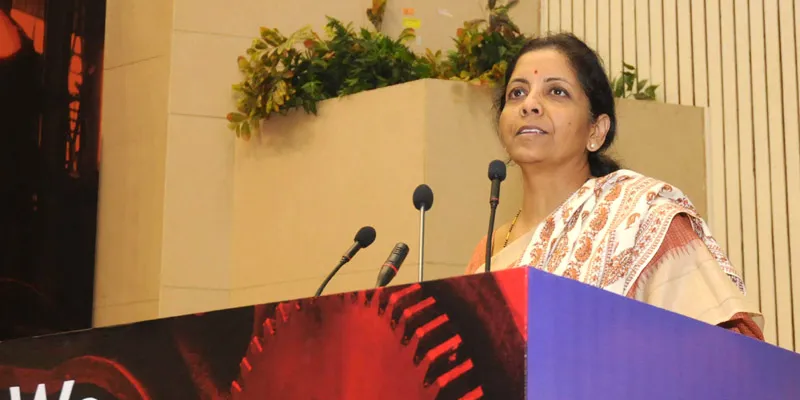What does the startup ecosystem expect from Finance Minister Nirmala Sitharaman's maiden Budget?
Finance Minister Nirmala Sitharaman is all set to present her first Budget on July 5. YourStory finds out what the startup ecosystem wants from Union Budget 2019, from taxation to ease of doing business.
All eyes will be on Finance Minister Nirmala Sitharaman on July 5 as she presents her first Budget. And expectations from the Union Budget 2019 are aplenty with the Bharatiya Janata Party (BJP) making a strong comeback following a resounding victory in the Lok Sabha elections.
Against this backdrop, the burgeoning startup ecosystem in the country is hopeful that the Budget would either give them an all-round boost or act as a catalyst to smooth out the rough edges.
The biggest challenge for startups in the country has largely been around the topic of taxation, be it in the form of Angel Tax, Minimum Alternate Tax (MAT), or the Goods and Services Tax (GST).
Issues of taxation
The issue of Angel Tax has resurfaced again. While the government had issued a directive that Angel Tax would not be applicable to startups, a latest clarification has stated that it would not be applicable on retrospective cases. This is a cause for concern.
Rehan Yar Khan, Managing Partner, Orios Venture Partners, says,
"Startups are hopeful that the newly elected government will present policies that address the need to exempt alternative investment funds (AIFs) from Angel Tax - one of the priorities for the ecosystem. The government had promised partial relief to the Angel Tax issue with startups being exempt from income tax on funding of up to Rs 25 crore. The execution of the resolution is yet to be seen; hopefully, the Finance Minister will work with the ecosystem to resolve it.”
Angel Tax is viewed as one of the biggest impediments for the startup ecosystem as prospective investors in the country, especially in the angel category, are hesitant to invest in startups. Industry experts believe that the pool of angel investors in the country might actually be stagnant or shrinking.
Nakul Saxena, Director, Public Policy, ISPIRT, says the Budget should set a clear path in terms of regulations that can incentivise the Angel Tax ecosystem. This would also help in greater inflow of domestic capital into the startups.
The National Association of Software and Services Companies (Nasscom) has, in its budgetary recommendations, sought proposals to grow India as technology startup hub. It has recommended that investments be encouraged through long-term capital gains from the sale of shares in unlisted companies being made exempt from tax while short-term capital gains be taxed at 15 percent instead of the current income tax slab of the individual.
Nasscom has also sought that the current regulation, which allows for MAT for all kinds of companies, be removed for entities with a turnover of up to Rs 250 crore.

Finance Minister Nirmala Sitharaman will have to manage the aspirations of the startup community and enable measures that will funnel domestic capital into investments.
Ease of doing business
The other aspect that startups have been clamouring for quite some time is the ease of business. For example, the introduction of GST has actually helped in simplification of the taxation system, but the delay in tax refund has hurt startups, which generally face a cash crunch.
Sachin Taparia, Founder and Chairman of LocalCircles, says, “Many startups and SMEs have reported that currently they become liable to deposit GST on behalf of their customers by the 20th of the following month. However, customers in many cases do not pay even after 90 days. This leads to cash flow issues for startups and SMEs, It is suggested that GST should become payable for startups and SMEs at the point of payment, and not on invoice generation.“
Sunil Goyal, Managing Director and Fund Manager, YourNest, says,
“As the startup ecosystem realisation matures, it faces several working capital issues which, in turn, hinder its long-term growth. We believe that the current norms for GST and tax deducted at source (TDS) are blocking significant money. A workable solution within the guidelines and definition for startups is much desired.”
Burden of fintech
Similarly, in the fintech space, which has been a big driver for the Indian startup ecosystem, growth prospects have been impacted due to an ongoing liquidity crisis and constant change in regulations.
Ashish Sharma, CEO, InnoVen Capital says,
“The one area that has been challenging is fintech balance sheet lenders; most companies are facing headwinds due to the NBFC crisis to raise both equity and debt capital.”
Ashish also highlights that the eKYC process for fintech has witnessed several changes, which has led to a certain amount of confusion.
Bhavin Turakhia, CEO, Zeta & Flock, feels the Budget should focus on an important element like technology.
“India’s online economy has made significant strides, shifting from a largely ‘cash-on-delivery’ model to now clocking a massive number of online digital transactions. In the upcoming Budget, an increased focus on better sops to build an infrastructure that can continue to empower individuals digitally will further boost our economy.”
The aspiration
President Ram Nath Kovind, while addressing a joint sitting of Parliament, assured of the government's intention to provide a fillip to the startup ecosystem. “To improve the startup ecosystem, the government is simplifying the rules. This campaign will be further expedited. Our goal is to establish 50,000 startups in the country by 2024,” he had said.
The Department for Promotion of Industry and Internal Trade (DPIIT), under the ministry that prepared the 'Startup India Vision 2024' document, also suggested setting up of 500 new incubators and accelerators by 2024, 100 innovation zones in urban local bodies, deployment of entire corpus of Rs 10,000 crore Fund of Funds, and expanding CSR funding to incubators.
But more still needs to be done.
Geetika Dayal, Executive Director, TiE Delhi-NCR, says, “It [government] needs to do away with outdated taxes that are eating into profitability and curtailing growth potential. Indian entrepreneurs do not need handouts, but they do need incentives and provisions that can help them realise their business goals and drive accelerated scale for their business ventures.”



1559301708193.png?fm=png&auto=format&h=100&w=100&crop=entropy&fit=crop)


1550563758084.png?fm=png&auto=format&h=100&w=100&crop=entropy&fit=crop)




